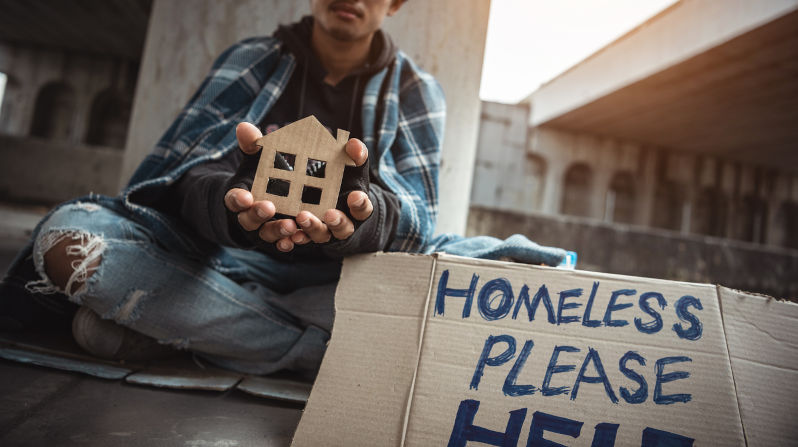Legislating for homelessness
July 16, 2024
“To be good citizens means owning your own home. If you don’t, you’ve failed in some way” – Sophia Maalsen, University of Sydney.
I sit at Brunetti’s with high school friends, wondering what I’m doing here. This group of intelligent women, educated at a prestigious girls’ school, are debating where to buy their second and third investment properties. They urge me to join the market, saying they fear for my retirement, reminding me that the fastest growing group of homeless persons in Australia are women over 55. On my way home I listen to _The Great Housing Disaster_ by the 7am Podcast. Sophia Maalsen, professor of Design and Planning at the University of Sydney, reminds us that “to be good citizens means owning your own home. If you don’t, you’ve failed in some way”, and that “your home is your retirement plan”. What do these widespread attitudes towards home ownership mean for lower income earners and homelessness?
The Australian Human Rights Commission states that “ access to safe and secure housing is one of the most basic human rights”. As of the 2021 census, 122,000 Australians are affected by homelessness. That’s 122,000 Australians who are unnecessarily without a home. We have enough shared wealth to ensure that this basic human right is universally met, yet something in our mindset prevents us from taking rapid, decisive, collective action on this issue. It is estimated that Australians need to earn at least $164,400 a year to be able to afford to buy a home without experiencing housing stress, making home ownership very difficult or impossible for much of the population. Is it a sense of righteousness and entitlement that leads middle- and higher-income earners to ignore these facts? First Nations Australians are drastically overrepresented in these numbers, making up 20% of the homelessness population but only 3.8% of the overall population. Not only did we march in here 236 years ago, steal Indigenous land and massacre local populations, but we are still denying housing to approximately 26,000 First Nations people, while claiming the right to make money from the buying and selling of land which isn’t ours to buy or sell in the first place.
I drive past an advertisement at the Coburg Cemetery urging me to “secure a piece of historic Coburg, limited sites available.” We have such a blinkered capacity to understand the impermanence of life that even in death we are seeking prime real estate. How can we justify existing at the constant expense of others? I am reminded of Nietzsche’s idea that morality is culturally constructed, and that we generally feel that something is ‘OK’ to do if everyone around us is doing it. 66% of Australians own their homes, how could I feel that there is anything wrong with owning a home? My mind swims back to Brunetti’s, where friends explain negative gearing and capital gains tax, two legal measures that permit tax deductions resulting in greater profits for property speculators. Then Hitler’s voice whispers in my ear, “the total state must not know any difference between law and ethics”. We don’t question the ethics of negative gearing and capital gains tax because the state has legalised them – this is a prime example of the law becoming absolute morality, and the lack of capacity of the populous to question the real impacts of common activities. We assume that if it’s legal, it must be good. In Understanding Power, Noam Chomsky invites us to question the ethical value of our actions by looking at the “anticipated consequences for human beings”. In order to do this, we must be able to critically engage with current practice.
The 2009 National Inquiry into Homelessness Legislation states that the “ causes of homelessness are complex and multifaceted”. This statement mystifies processes of law, deliberately making it inaccessible. Max Chandler-Mather, Australian Housing and Homelessness Spokesperson, explains that the government will try to demobilise collective action and claim that it’s too complex an issue to do anything about, but that this is designed to “ lower people’s expectations of what the government can do”. He says we must be insistent, creative, and collaborative. The Inquiry into Homelessness looks at key drivers such as affordable housing and the link between public housing policy and homelessness support services; however, it makes no connections between the culture of the property market, negative gearing or capital gains tax and homelessness. For all the money, energy and time spent on this inquiry, there has been no capacity to think holistically and make lateral connections. The Charter of Human Rights and Responsibilities requires all public authorities to “give proper consideration to human rights before making a decision” and to “ act compatibly with human rights”.
We know that a right to a home is a basic human right, yet we have 122,000 homeless people in Australia. Somewhere along the line, we done f*cked up.
In The Great Housing Disaster, the 7am Podcast highlights that it is landlords in parliament who are writing and passing legislation, and that this creates a conflict of interests. “They can’t relate to how dire the problem is”.
It’s our job to insist that they do.
